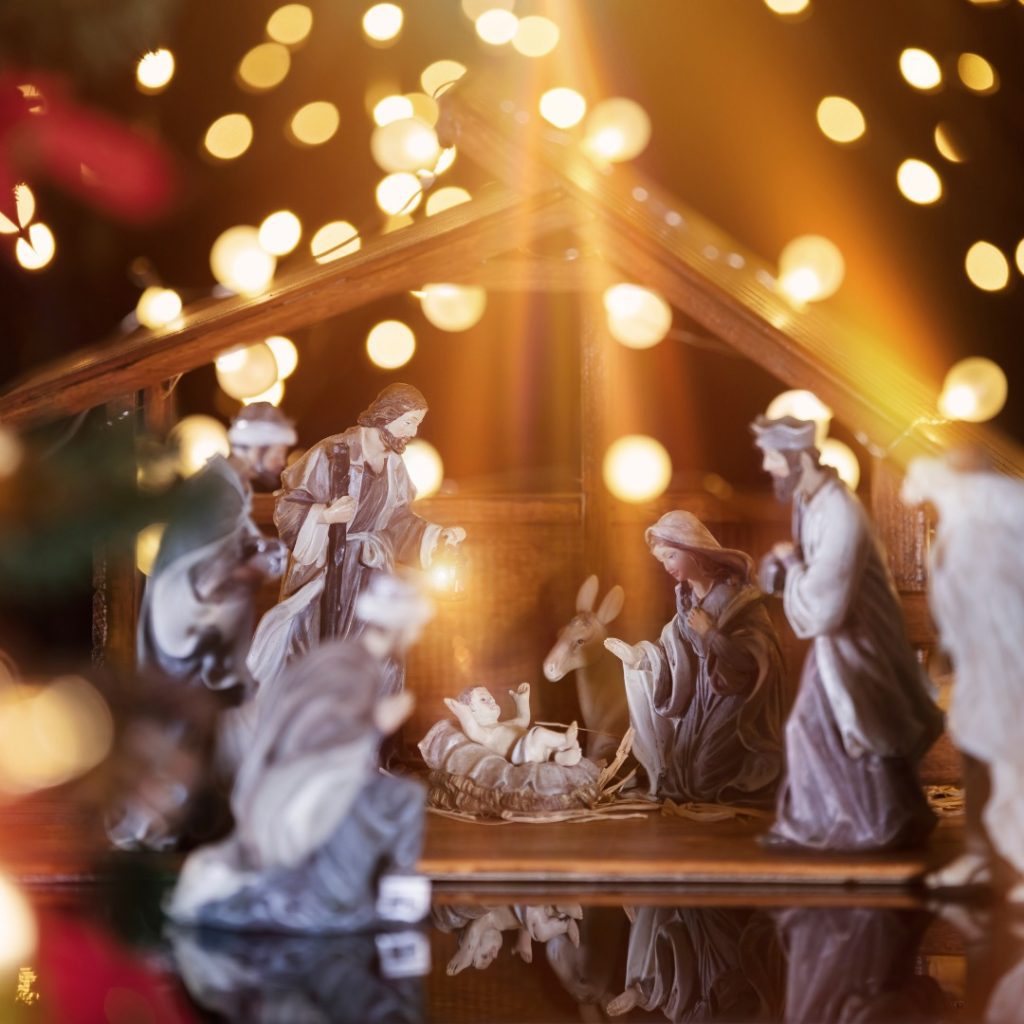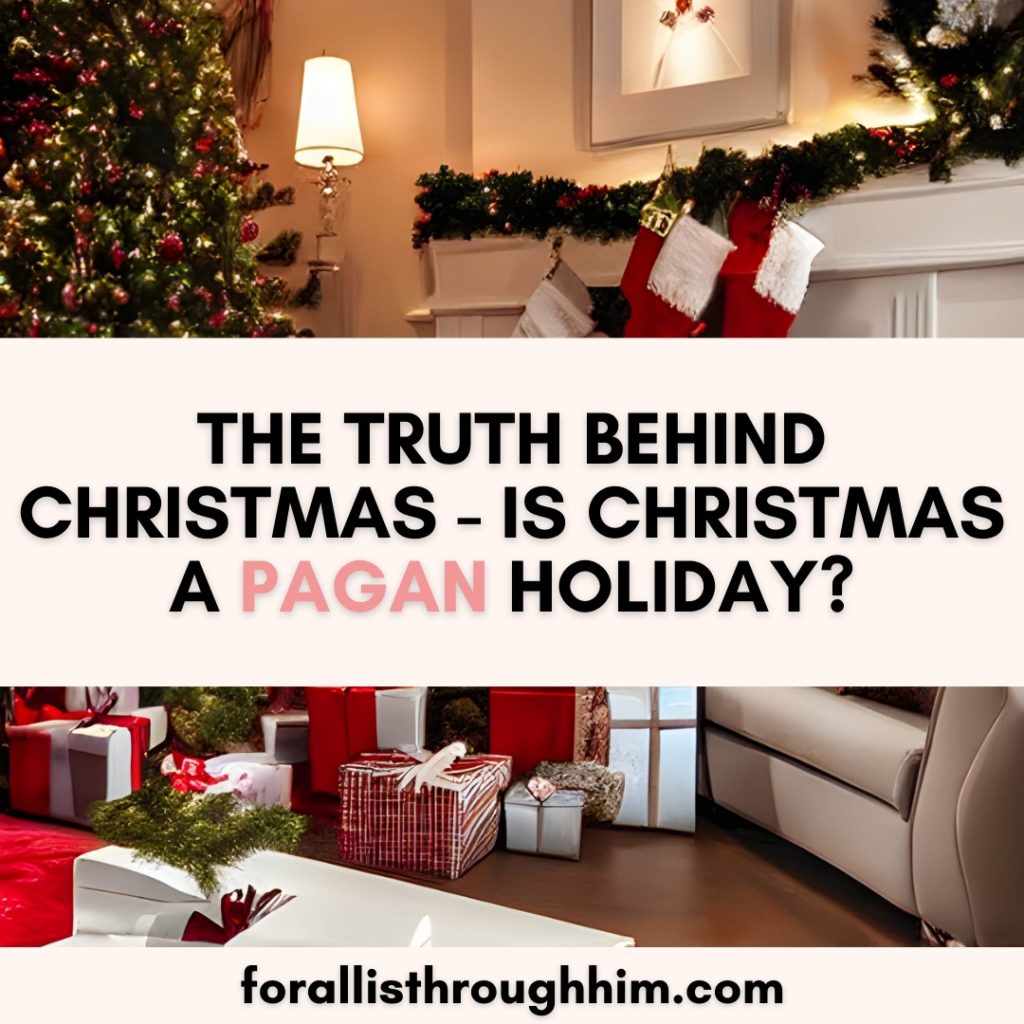Is Christmas a pagan holiday?
Should Christians celebrate Christmas?
Who is Saint Nicholas?
Was Jesus really born on the 25th of December?
You probably have heard a lot of conspiracy and controversy behind the celebration of Christmas. You may have asked yourself these questions or many others. This blog post will debunk the myths that surround Christmas, and get to the truth of it all.
Let’s dive in!
Is Christmas a Pagan Holiday?

Some people believe that Christmas is a pagan holiday due to the alleged association it has with gods and goddesses from centuries ago. One of the most popular mentions is Mithra, a Persian god from 1200BC, claimed to have been born of a virgin, born on December the 25th, had 12 disciples, performed miracles, died for 3 days, was resurrected and was worshipped on Sunday.
These claims are all false and have been perpetuated by individuals from sources with no historical origin or ancient evidence to date back to confirm all of these claims. The only source you can find is modern books making these false claims.
What we do find with the historical origin and ancient evidence is in fact Mithra was born fully grown out of a rock wearing a hat, there is no date given of his supposed birth, he only had 1-2 disciples, he didn’t perform any miracles he is known for killing a bull, there is no record of him dying and therefore it is difficult to justify his supposed resurrection, and Sunday worship was a popular Christian religious gathering long before Mithraic cult was even a thing.
You can find the same false claims being made for gods and goddesses, such as Horus and Dionysus with no ancient document to support these claims made about them having an association with Christmas being a pagan holiday.
So, the answer to the question is, NO, Christmas is not a pagan holiday.
Are Christmas Trees a Pagan Symbol?

Many people, including Christians, have used Jeremiah 10 as a way to argue that Christmas trees are condemned in the Bible. But context is key. For one, the invention of Christmas trees was more than 2,000 years after Jeremiah 10, was written.
Jeremiah 10 is clearly condemning the practice of carving out idols from wood, gold and silver as a means to worship a lifeless god in contrast to worshipping the True and Living God. The point that prophet Jeremiah was making is that it is evil and foolish for people to create their own god, not that decorating trees is evil.
We see the nature of this context throughout scripture. Prophet Isaiah condemned the people making their own god, worshipping and praying to it (Isaiah 44:14-17). Apostle Paul condemned the people of Athens for idol worshipping (Acts 17:29).
The problem is not Christmas trees, the issue is idol worshipping. So, if people are worshipping and praying to their Christmas tree then Jeremiah 10 will totally apply. But that is not the case, Christmas trees have never been used in that way.
Christmas trees can have symbolic meanings, not necessarily pagan ones. Isaiah 11:1-10 prophecies about the family history of the coming Messiah being the “Branch from Jesse”; the father of David. In the modern day, we call this the Jesse Tree, which is a great and fun activity to do with your family, especially with kids to teach them the prophecies of Jesus and how He can be seen in the Old Testament.
The origin of Christmas trees is debated, but an evident historical trace of the use of Christmas trees is in Germany in the 16th century during the Protestant Reformation. Christmas trees gained their popularity through the British Royal family through Prince Albert in 1840, who imported several spruce firs from his native Coburg, Germany. So, what was once a German tradition became a British Empire tradition including popularising in the United States of America.
So, the answer to the question is, NO, Christmas trees are not a pagan symbol.
Where did Santa Claus come from?

Santa Claus is a merge of Saint Nicholas who is a real person and Father Christmas who is a fictional character.
Who is Saint Nicholas? He was assumedly the Bishop of Myra in the 300s AD. There is not much historical evidence about him, but there are tons of legends about him. He is famously known to be a wealthy man who lost both of his parents to illness, and he gave his wealth to the poor and needy.
Saint Nicholas Day was a day to commemorate his gift-giving celebrated in early December but was moved to Christmas Day due to Martin Luther, to celebrate Christ’s birth. It may have been because Martin Luther removed All Saints Day from the liturgic calendar except for those celebrating biblical saints.
Father Christmas with a long white beard, wide stature and a red and white outfit is a mythical person that immersed in the early 1800s in the United States of America when a revival of Saint Nicholas as the patron saint of children began again, but it took on a new form with no actual connection to Saint Nicholas Day. Scholars say that this left Christmas day open to non-Christian behaviours of drunkenness and revelry.
So, the answer to the question is, Santa Claus supposedly originated from the legend of Saint Nicholas but in the modern day he has no association with him or Christ.
Was Jesus Born on the 25th of December?

There is no mention in the Bible of Jesus’ date of His birth. In actuality, scholars believe that His birth may have been in the spring, due to the fact that it is less likely that the shepherds who were herding their sheep during the time of Jesus’ birth would have been doing that during the winter. But some scholars have argued against this.
However, because of this, claims have been made that the 25th of December is the Roman celebration of Saturnalia and therefore, it supposedly makes the date of this celebration pagan. But is it really?
The Roman celebration of Saturnalia was actually celebrated on December 17th-23rd. The 17th was the day the Romans celebrated Saturnalia but slowly they extended the festival to a week because they enjoyed it.
The celebration of Saturnalia included going house to house singing naked, human sacrifice, “freedom” for slaves (which was really a mockery), drunkenness, rape and sexual immorality. There is no association here with the way Christmas is celebrated.
So, why do Christians celebrate Christmas on the 25th of December? We don’t know for certain the real reason. Modern scholars say because it is 9 months from Passover. It is believed in Jewish tradition that prophets die on the day they were conceived. So, Jesus died on Passover, March 25th (the assumed day He was conceived), and 9 months after that brings us to December 25th (the assumed day He was born).
So, the answer to the question is, we don’t know for certain the day Jesus was born, but we do know that the 25th of December has no relevance to the Roman celebration of Saturnalia.
Were there Three Magi?
The Bible does not say there were three of them. There may have been more or two. Tradition says their names were Gasper/Casper, Melchior and Balthazar. They visited baby Jesus in a “house”, not in the manger, which means it took them a long time to get to Bethlehem (Matthew 2:11). They came from the East, most likely Persia, modern-day Iran and they travelled 900 miles to get to Bethlehem to visit baby Jesus. They were guided by a miraculous stellar event, the “Star of Bethlehem” which they called “His star” (Matthew 2:2) to visit and worship baby Jesus.
They brought three gifts:
- “Gold” symbolised royalty and divinity to represent Jesus as the King of kings and God in flesh.
- “Frankincense” is burnt and highly fragrant when used in worship to God, this was to symbolise Jesus sacrificing His life for the world as a fragrant offering to God.
- “Myrrh” is a spice used for embalming in burial to represent the death and resurrection of Jesus.
So, the answer to the question is, we don’t know if there were three wise men, it is assumed because of the three gifts.
Should Christians Celebrate Christmas?
Biblically, the event of Jesus’ birth was celebrated. The Magi came with gifts to honour and worship baby Jesus, the shepherds spread the message of the Messiah being born, and the angels announced the birth of Jesus. Although the date of Jesus’ birth is not mentioned in the Bible, evidently the event of His birth was celebrated, deservingly so.
Clearly, if the event of Jesus’ birth was commemorated in the Bible, then Christians wanting to continue the celebration in the modern day should not be a problem. Christians have made Christmas a day for the masses to celebrate Christ.
So, the answer to the question is, YES, Christians can celebrate Christmas.
We can take away from this blog post that Christmas is not a pagan holiday and Jesus is the reason for the season.
There is so much to digest here, but I don’t want you to just trust my words and research, research for yourself. I have listed below some resources that I have read and some I have used in this blog post.
Leave a comment sharing what you have learnt from this blog post. Share this blog post with someone who will benefit from learning about the truth of Christmas.
Stay blessed,
Divine L.
Resources
- Is Christmas Pagan? | Mike Winger – YouTube Video
- Debunking Christmas Myths | Mike Winger – YouTube Video
- Jesus vs. Mithra | Inspiring Philosophy – YouTube Video
- Jesus vs. Horus | Inspiring Philosophy – YouTube Video
- Jesus vs. Dionysus | Inspiring Philosophy – YouTube Video
- Christmas is Not Pagan | Christians Answers for the New Age – Website
- The Myth of the Pagan Christmas | Chris Jensen – Website
- Does Jeremiah 10 Forbid Christmas Trees | CARM – Website
- Nimrod and Christmas Trees | As Bereans Did – Website
- How December 25 Became Christmas | Biblical Archaeology Society – Website
- Do Sheep Prove that Jesus wasn’t Born on December 25th | Jimmy Akin – Website
- Three Wise Men | Got Questions – Website
- Discerning Christmas | Verity by Phylicia Masonheimer – Podcast
- Seasonal Celebrations | Phylicia Masonheimer – Book

Hi, I am Divine L., your sister-in-F.A.I.T.H., who is passionate about discipling Christian girls to be a walking embodiment of Jesus Christ in their daily lives and to help young girls and woman become who God destined for them to become. It is a great blessing to welcome you to the F.A.I.T.H. sisterhood!

